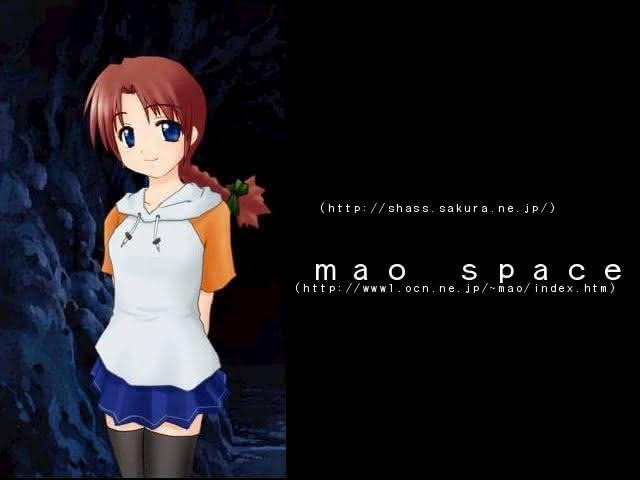Wanderers in the Sky is a freeware Japanese visual novel that was first released in Japan for Windows as Sora no Moyoibito on October 20, 2005. It was officially translated into English for the 2006 al|together festival and made available for Windows, Linux, and MacOS on August 19, 2006. In this post, will review Wanderers in the Sky as part of my ongoing project to review nearly all of the 30 freeware visual novels that were translated as part of the 2005, 2006, and 2008 al|together festivals.
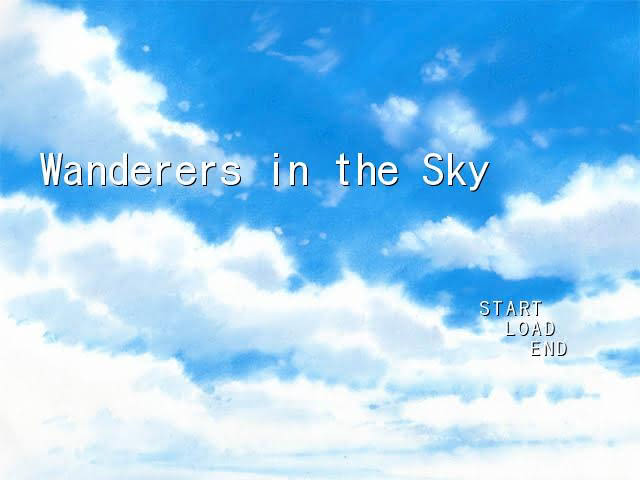
Wanderers in the Sky is a short visual novel wherein the protagonist wanders in a strange world, unable to remember what exactly he had lost. My entire review down to the conclusion will be spoiler-free, so it is safe to read for those who are deciding whether to try Wanderers for the Sky.
Wanderers in the Sky Details
English Release
| Title | Wanderers in the Sky |
| Translator | zalas |
| Release Date | August 19, 2006 |
| Engine | ONScripter |
| Official Website | altogether 2006 |
| Visual Novel Database | VNDB Link |
Japanese Release
Downloading and Running Wanderers in the Sky
Download Links
- Official (Direct and Torrent): Windows, Linux, and MacOS
- Kaisernet Mirror (Windows direct only): Windows
Wanderers in the Sky is still available via direct download for Windows, MacOS, and Linux. Torrent downloads are also available, but I have not yet tested their availability.
I ran Wanderers in the Sky natively on Linux, and I also ran the Windows version on top of WINE. Those interested in running the native Linux version may consult my guides on installing ONScripter on Linux, running ONScripter in a Linux directory, and extracting the contents of a Windows .exe. I have not personally tested the MacOS version, but I assume that it should work on MacOS (and BSD so long as the BSD-user can build ONScripter-EN).
Note on My Review
Despite the fact that I can run Wanderers in the Sky natively on Linux, I reviewed the Windows version on top of WINE. The reason for this has to do with a particular, likely temporary, issue I have involving MIDI. Wanderers in the Sky, like several other al|together games, uses a MIDI file for its sound. I explained in a previous post that I have had to jump through some hoops to get sound from games which rely on MIDI. My previous set-up stopped working, so I had to set things up a different way. At the moment, I am not getting sound from ONScripter MIDI games that I run natively on Linux, but I am having no issue with the Windows versions on WINE. While I prefer running native Linux versions – the experience on Linux is the same running the Windows version for all normal intents and purposes, so I took the path of least resistance.
General Overview of Wanderers in the Sky
The al|together 2006 website describes Wanderers in the Sky as follows:
The protagonist finds himself wandering in a world of loss, unable to remember exactly what was missing. Through the help of people in his life, he finally starts remembering …
Unlike the somewhat poetic description of Red Shift on the Insani website that I covered in my previous review, this description to-the-point. In light of the fact that Wanderers in the Sky runs for about 15 minutes, the introduction can be forgiven for its brevity.
However, the English localization of Wanderers in the Sky features a poetic synopsis of the story for those who prefer poetry to prose:
That day... I sought the sky... Where she was... (I want to see you...) And thus, I arrived at this place... At the edge of all heavens, "Sky's End"...
This poetic description is also on-point, and it is along the lines of what most readers should begin to suspect early in the play-through.
The view-point character begins the game in what appears to be a forest at night, talking about how he cannot remember what he has forgotten, but only knows that it was important.

The protagonist appears to be unsure whether he even wants to remember, or whether he wants to forget and fade-away. He wakes up the next morning in a grassy field, looking at the clear blue sky. There, he meets a girl – the only person in this world – who takes an interest in peppering him with questions.
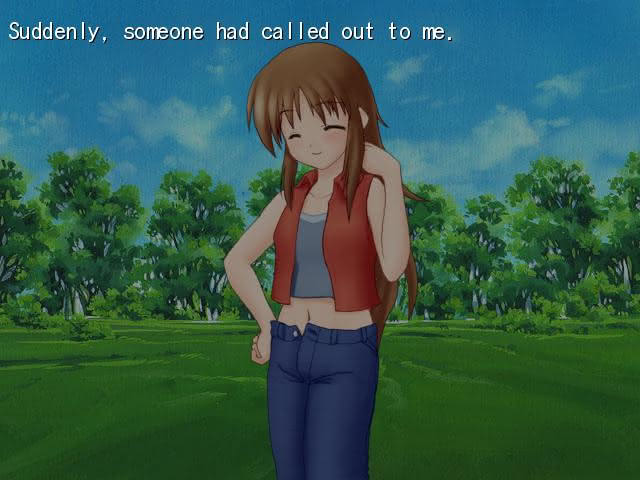
Depending on a choice (we will get to choices shortly), the protagonist goes somewhere to find the answers that he has within, but has forgotten.
Wanderers in the Sky Review
In the following sub-sections, I will review different aspects of Wanderers in the Sky.
Game-play and structure
The only things I read about Wanderers in the Sky before starting play were the al|together introduction, the Readme summary (that came while I was looking up things about its engine), and the fact that Visual Novel Database voters had pegged the game as taking 15 minutes to read (accurate). The game begins in typical ONScripter visual novel style, with walls of text overlaying a static background. Nothing about Wanderers particularly suggested that it would have choices.

Imagine my surprise when, a few minutes into my first reading, I was not only confronted with a choice, but with a choice that was also meaningful.
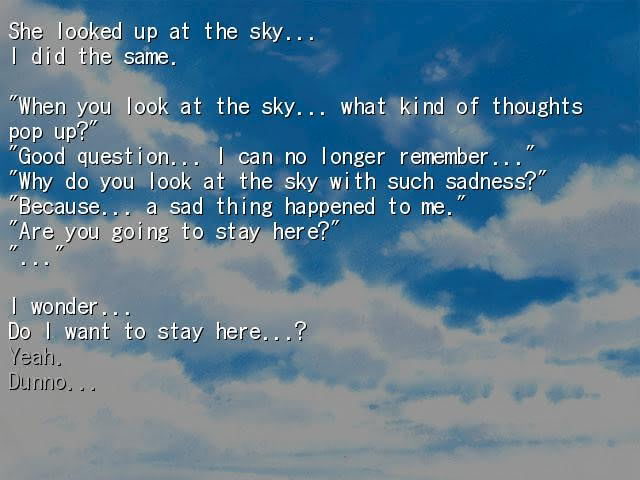
Wanderers in the Sky features three choices. Each choice is meaningful, but the game’s structure is very simple. There is a good and bad choice at each juncture. Choosing the bad choice effectively ends the game on the spot (this structure is similar to Bad End, a commercial visual novel that I reviewed). Choosing the good choice at the first two junctures advances the story, and the final good choice leads the player to the good ending.
Wanderers in the Sky is broken into several short chapters. There is also a short scene which comes after the credits for those who make it to the good ending.
For those who want to try all the choices (or make sure they do not choose wrong), Wanderers in the Sky allows creating save points on choice dialogues – which I took advantage of for testing purposes. It also has skip functionality for speeding through text.
Visual presentation
Anyone with passing familiarity with NScripter/ONScripter visual novels will recognize all of the visual hallmarks in Wanderers in the Sky. The quality of its presentation is a bit of a mixed bag, as I detail below.
Backgrounds
Many of the visual novels that we have looked at thus far use photographs for backgrounds. Wanderers in the Sky, however, is most similar to the first of the al|together visual novels I reviewed, The Poor Little Bird. All of its backgrounds are fully drawn instead of based on photographs. While they err on the generic side, the backgrounds are solid and they fit the game’s mood and setting well. Moreover, they accommodate the characters. The backgrounds are the strongest part of Wanderers’s visual presentation. As for the characters…
Characters
Wanderers in the Sky features five characters will full body portraits – a surprising number given both the story’s short length and its solitary beginning. While this may sound intriguing in the first instance, the character models are, universally, a bit lacking. They are stiff, have limited expressions, and odd proportions. The strangest of the models is the first young woman whom the player meets – what is with the whole get-up?

The other characters, save for a certain red-haired boy, fare a bit better.
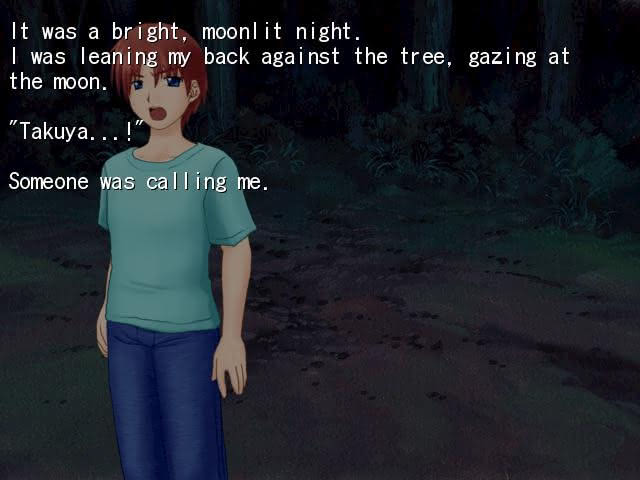
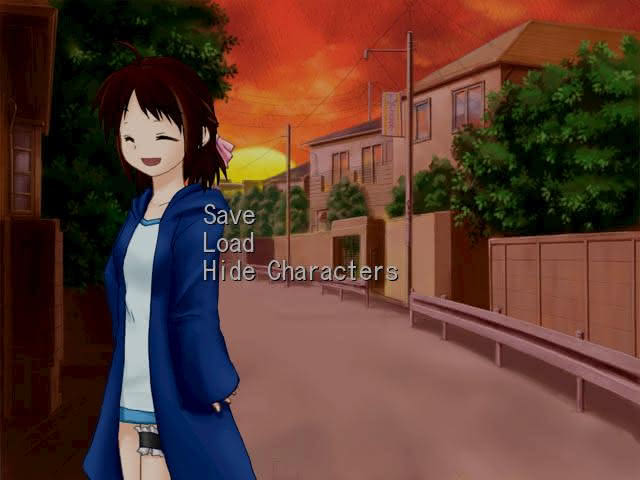
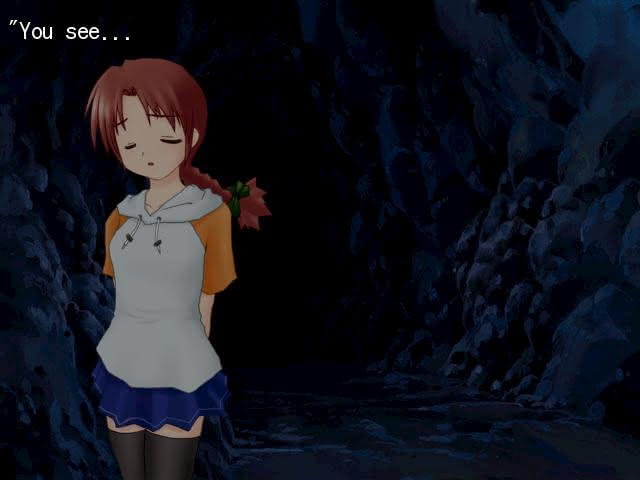
But not much better…
Unlike May Sky, where I admitted that the heroine’s design grew on me over time, I do not think that the cast of Wanderers would have grown on me had it been a longer game. The character designs are inoffensive (save for one that is offensively weird), but wholly unmemorable.
Text
The text in Wanderers overlays the background and characters in a style that many ONScripter visual novels use, including several which we have already looked at. For those not familiar with our reviews, the original and Manga Gamer versions of the Higurashi and Umineko visual novel series employ the same style. (See examples in previous screenshots.)
Music
The background music is the strongest point of Wanderers in the Sky. While not memorable, the pieces fit with the game’s somber and somewhat mysterious mood, and are more than varied enough to avoid becoming repetitive. (I did have some skipping issues which likely had to do with my Fluidsynth (MIDI synthesizer) configuration, but they are not so severe as to make me figure out how to change my Fluidsynth settings or soundfont to resolve them.) Wanderers’s soundtrack is solid generally and good by the standards of the al|together games that I have reviewed thus far.
Translation quality
I append my analysis of the translation to explain that I am only reviewing how the game reads in English. I have never played the original Japanese version of Wanderers in the Sky, and even if I had, I cannot read Japanese. Thus, I can only review the translation from an English-speaking reader’s perspective.
Wanderers in the Sky read smoothly, and I tip my hat to the translator for conveying the mixed emotions of the characters in a clear way. I do not recall coming across any points where I thought the translation was so awkward as to make a note of it here. Like all of the al|together games I have read thus far, it is a good effort.
Writing and story quality
Wanderers in the Sky begins with some promise – the protagonist’s monologue about forgetting and disappearing as he wanders through a dark forest is, at a minimum, intriguing. While Wanderers in the Sky turns out to be somewhat ambitious for a short affair, the first scene proves to be the pinnacle of the story.
Without spoiling the story, Wanderers in the Sky plays with many of the same ideas that we saw in one of my earlier al|together reviews, that of From the Bottom of the Heart. The similarity occurred to me before I found that the phrase “from the bottom of the heart” appears late in Wanderers in the Sky. I liked the former visual novel enough to write a very long analysis of its story (you should read the story before the analysis). Wanderers in the Sky reads better in English than From the Bottom of the Heart, but its advantages end there.
From the Bottom of the Heart did enough in its very short run (it is slightly shorter than Wanderers) to give the reader some reason to care about its three named characters. Wanderers goes for impact when it finally reveals that, unsurprisingly, the main character had forgotten something very sad. However, but with that being revealed at what was almost the last possible moment, its impact is neutered by the fact that we still know next to nothing about any of the characters.
Why should we care?
Again, without spoilers, I noted that Wanders features five characters with full portraits. They are introduced one after another with very short intros narrated by the protagonist. They each have opinions, but these are the opinions of people we do not know about matters we are not acquainted with. The epilogue is supposed to be a good, happy ending – well deserved for all of the characters. But again, we barely knew the characters. They are forever defined by their trials (a couple are not really defined by anything at all, but that is neither here nor there), and we are never told enough about those trials for them to have an impact.
The central issue in Wanderers is not a difficult to discern. I will venture that many readers will understand the general gist of where the story is headed after the second scene. There are, however, issues that come between us and the ending. The issues are weird – and Wanderers relies on genre staples without delivering them in a reasoned, creative way. Some of the protagonist’s actions in striving to forget make little sense.
Where did Wanderers in the Sky wander astray?
Wanderers in the Sky foreshadowed its problem with its name. The precious first half of the story involves the seemingly (albeit, metaphorically) amnesiac protagonist wandering about. This time could have been better spent giving us some hook to care about the protagonist and what he would eventually remember. Instead, all of the memories are dumped on the reader at the end. We suddenly stop wandering and rush to a bittersweet happy ending – but neither the story nor the characters earned the happy ending in an aesthetic sense.
At its core, Wanderers in the Sky is a story about choosing to confront the sad things in one’s path, even if doing so is painful, instead of running away. This was also the core theme of From the Bottom of the Heart. However, where From the Bottom of the Heart established a reason to care about its small cast in a short period, Wanderers in the Sky forgot that important step. From the Bottom of the Heart ends cathartically, albeit in medias res. Wanderers in the Sky ends coherently, but nevertheless leaves the reader confused. Wanderers either needed to be longer (which would have given it more time to work with the amnesia plot and develop the protagonist’s memories) or less ambitious (drop one plot or the other and focus). It tried to do too much in too little time,.
Final Assessment
Wanderers has a few things going for it, namely its solid background and musical choices and that it reads well. Those who enjoy choices will also appreciate the fact that it is interactive, even though its choice structure is very simple. However, for reasons I discussed above, it is let down by its story, and its attempt at a heartfelt ending ultimately leaves little impression. The ideas were there, but the discipline to incorporate them in plot and characterization was not.
It should go without saying that I do not recommend Wanderers in the Sky in a vacuum. For those who may be interested in reading high-quality lesser-known indie visual novels, there are better options in the al|together collection, including several that cover some of the ideas and themes of Wanderers in the Sky in a more interesting way (for that I recommend From the Bottom of the Heart and Shooting Star Hill).
However, if you are interested in the al|together project and some of these older, freeware visual novels generally, there is no harm in giving Wanderers in the Sky a quick read while you are working through them. Other than the MIDI issue (how much of an issue that is may depend on your set-up), in runs fine cross-platform and is readily available as a direct download. There is always the chance that some readers will disagree with my assessment – I did see a few above average scores by Visual Novel Database users.
While Wanderers missed the mark for me, creating an indie visual novel is not easy, nor is doing so without asking for compensation. I respect the effort that went into Wanderers, which was not short on ambition, and its solid localization.
